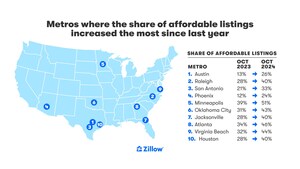Renters of Color More Likely to Pay Application Fees
Ease of moving is considered a virtue of renting, but higher upfront fees could limit mobility for Black, Latinx and Asian renters, as well as those in the LGBTQ community.
SEATTLE, Feb. 4, 2020 /PRNewswire/ -- While many renters aspire to be homeowners and are saving toward that end, others choose renting as a lifestyle choice, saying it better suits them or makes them more able to chase career opportunities.
But the cost to move into an apartment depends a lot on where you live -- and who you are.
Nearly 9 out of 10 renters pay a security deposit, for example, but fewer than two-thirds pay an application fee. And while deposits are similar across demographic groups, younger renters, renters of color and those in the LGBTQ community are more likely to pay application fees, which also vary by home type and location, according to the most recent Zillow® Group Consumer Housing Trends Report.
Those fees typically run $50 per application and may include a background and credit check to assess financial risk. The average renter who is moving applies to more than three rentals.
While there are a variety of reasons people prefer to rent, many do because their finances dictate that they must. The median household income for renters is $37,500, half of the $75,000 annual income of homeowners. And only half of renters say they could afford an unexpected $1,000 expense, compared with 80% of homeowners.
Those financial constraints mean that even those who might see eased mobility as a virtue of renting could also see that mobility hindered by upfront costs. It can be especially difficult for renters trying to decide between absorbing a rent increase beyond their budget or paying upfront costs to move. Indeed, 35% of renters say paying the upfront costs is their greatest hurdle to securing a new rental.
Landlords charge urban and suburban tenants application fees at higher rates than their rural counterparts – likely a response to more competitive rental markets in cities and suburbs. And there are regional trends, as well: Renters out West and down South are more likely to pay an application fee (71% and 68% do, respectively) than those in the Midwest (56%) or Northeast (54%).
A renter's race also is predictive of whether they will pay an application fee: 56% of white renters pay one, compared to 73% of Latinx and Black renters, and 84% of Asian renters. Even when controlling for urbanicity (renters of color are more likely to live in urban markets), the disparity persists. Other variables like LGBTQ identity contribute to the probability of an application fee: Cisgender and heterosexual renters are less likely to pay one (63% do) than LGBTQ renters (73% do). When controlling for variables like age, income, home type, urbanicity, and region, LGBTQ renters are more than 1.4 times as likely to pay an application fee, and renters of color are more than twice as likely.
Security deposits are more uniformly required, Zillow's survey shows, with the typical deposit being $600. Renters in typically larger single-family homes are more likely to see higher deposits, with a median of $850 and nearly 40% paying at least $1,000. But they are least likely to pay an application fee, with about half doing so. Renters in multifamily buildings who pay a security deposit, by comparison, typically pay $500. But multifamily renters are more than 1.2 times as likely to pay an application fee than single-family renters.
"Renting a home provides flexibility to move more easily, whether for a new job, changing family circumstances or any number of other factors. But that flexibility isn't free," said Zillow chief economist Skylar Olsen. "Renters face a number of upfront costs, including application fees and security deposits, that can often run into the thousands of dollars – and not all groups of renters will feel these costs equally. There are sound economic reasons why renters in different places would pay different upfront costs to rent a home, as landlords try to cover the risks of unpaid rent, unexpected repairs, or surprise vacancies. But the potential for discrimination against certain renters, whether overt or unintended, cannot and should not be discounted. Examining the different paths renters take to securing a home – and the different costs paid to get there – can help to identify blind spots where the market fails to provide a level playing field."
The 2019 Zillow Group Report on Consumer Housing Trends is the 4th annual largest-ever survey of U.S. home buyers, sellers, owners and renters, and asked 13,000 U.S. household decision makers aged 18 and older about their homes – how they search for them, pay for them, maintain and improve them, and what aspirations and challenges drive their decision. Data from the full report is available for free to the public at www.zillow.com/report, and custom analyses are available to journalists by emailing [email protected].
About Zillow
Zillow® is transforming how people buy, sell, rent and finance homes by creating seamless real estate transactions for today's on-demand consumer. Zillow is the leading real estate and rental marketplace and a trusted source for data, inspiration and knowledge among both consumers and real estate professionals.
Zillow's proprietary data, technology and industry partnerships put Zillow at nearly every major point of the home shopping experience, helping consumers search for and get into their new home faster. Zillow now offers a fully integrated home shopping experience that includes access to for sale and rental listings, Zillow Offers®, which provides a new, hassle-free way to buy and sell eligible homes directly through Zillow; and Zillow Home Loans, Zillow's affiliated lender that provides an easy way to receive mortgage pre-approvals and financing. Zillow Premier Agent instantly connects buyers and sellers with its network of real estate professionals to help guide them through the home shopping process. For renters, Zillow's innovations are streamlining the way people search, tour, apply and pay rent for leased properties.
In addition to Zillow.com, Zillow operates the most popular suite of mobile real estate apps, with more than two dozen apps across all major platforms. Launched in 2006, Zillow is owned and operated by Zillow Group, Inc. (NASDAQ:Z and ZG) and headquartered in Seattle.
Zillow and Zillow Offers are registered trademarks of Zillow, Inc.
SOURCE Zillow

Related Links
WANT YOUR COMPANY'S NEWS FEATURED ON PRNEWSWIRE.COM?
Newsrooms &
Influencers
Digital Media
Outlets
Journalists
Opted In






Share this article